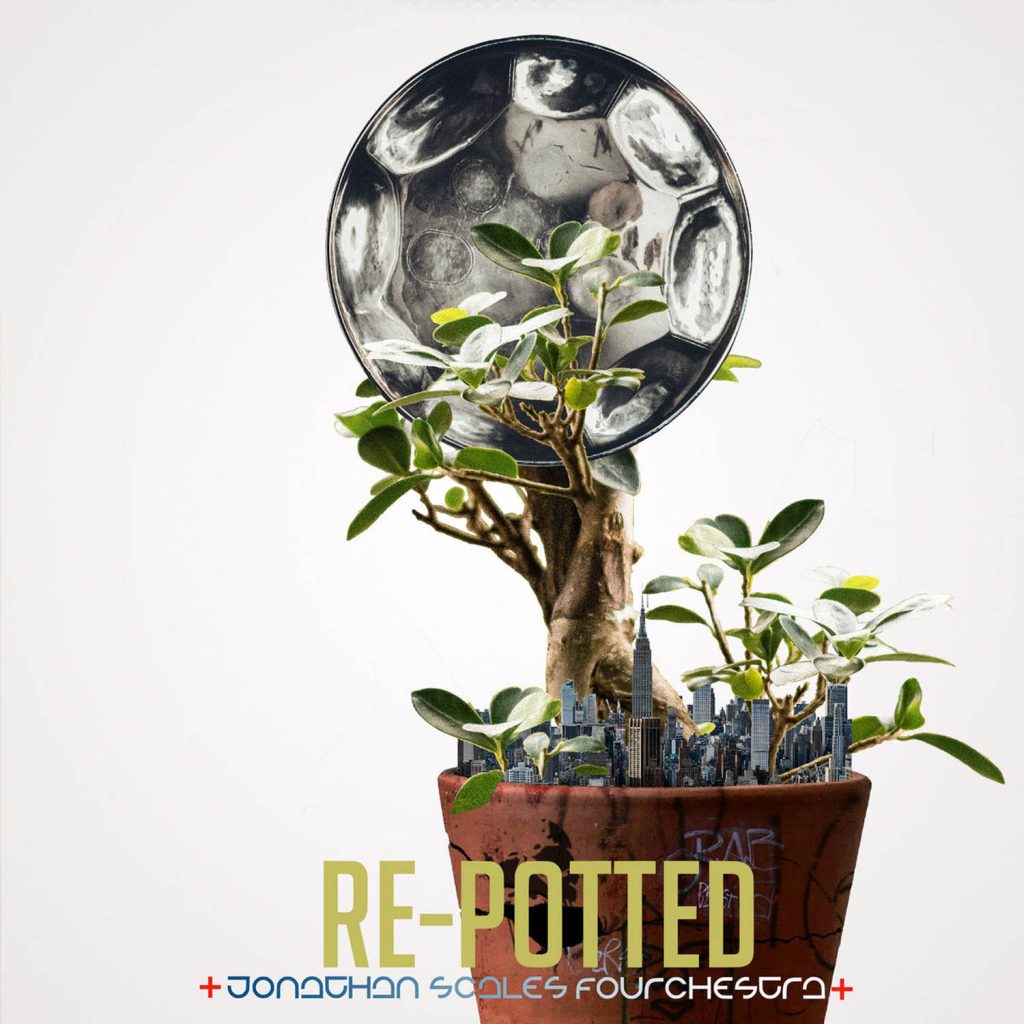This month’s listening picks from the Caribbean — featuring reviews by Nigel A Campbell of new music by Jonathan Scales Fourchestra; Etienne Charles; Hey Choppi; and Hugh Masekela & Siparia Deltones
Jonathan Scales Fourchestra
Re-Potted (Le’Rue)
The angular harmonies and rhythms of modern jazz fusion present a rare context for the steelpan to interact, to play to its potential, to exist. Jonathan Scales is an American musician and composer recently transplanted to Brooklyn, New York. And in his hands, the instrument — in the company of his trio’s sublime bass and poly-rhythmic drums — heralds another way to engage with one’s soul outside a Carnivalesque celebration. On this, his eighth album of steelpan jazz, he explores “what it means to ‘uproot and replant’ into a more expansive yet more challenging environment”. How that translates on the instrument is a heady mix of musical modes, melodic adventures, and varying soundscapes — rap, wordless vocals, found-object percussion, strings and horns — where challenging rhythmic changes make for a focus on how this juxtaposition of instruments brings resolution to a journey. Steelpan, “the audacity of Creole imagination”, has evolved beyond the islands.
Etienne Charles
Live in San Francisco, Vol 1 (Culture Shock Music)
Prolific recording artist and composer Etienne Charles is taking his Caribbean jazz trumpet to important venues to play to audiences everywhere the music gleaned from the wanderings of his Creole soul. The Black Cat, “in the historic jazz district of Tenderloin in beautiful San Francisco”, is the setting for the recording of a live album that excerpts his Carnival opus; charts the arc of Caribbean composers Lord Kitchener, Bob Marley, Winifred Atwell, and Juan Tizol; and incorporates his new composition, “Greenwood”, which elucidates a monumental episode in American history. “Greenwood” musically translates the violence, chaos, angst, and pathos of the 1921 Tulsa race massacre against African-Americans in “Black Wall Street”. The wilful attempt by others to erase this history is countered here by transcendent musicianship and sound recording clarity that enlivens excavated histories and recalled stories from survivors. One can’t wait for Vol 2.
Hey Choppi
Saga Boy (Monk Music)
In the 50 years after the cultural beginnings of hip-hop in America and soca in Trinidad, derivative music genres have exploded across the Caribbean diaspora and “Black Atlantic”. Evolved music styles like zess music and drill, soca grooves that fuse with dancehall, Afrobeats and modern hip-hop rhythms have created pathways for new Caribbean artists to explore making music for the commercially important Millennial and Gen Z generations. Hey Choppi, the Trinidadian saga boy himself, utilises all these styles on his new album to cheekily and slickly project his carnal desires into danceable short jams. These are adult songs for adults, hip music for hip folk, Caribbean music that signals the ongoing evolution and quest to cross over to a broader audience beyond the islands. Collaboration is a tool for relevance outside a local market: Jhay Bhad, Timo, Machel Montano, Nailah Blackman and more add to this slow burner.
Hugh Masekela & Siparia Deltones
Mango Tree (Monk Music/Gallo Record Company) • Single
Sitting under a fruit tree has been inspirational — for centuries. The story of Isaac Newton under an apple tree coming up with the theory of gravity is apocryphal. For Trinidadian jazz musician Carlton “Zanda” Alexander, a mango tree was the key to a composition that celebrates tropical idyll. Sitting under de mango tree / Watching baby mangoes fall / Making room for more to come, with tiny stems and all / Suddenly, I heard a song / Dancing through the leaves / A lonely mango fall. That song has taken a long journey to release. A decade in the making, a musical project (From Siparia to Soweto) among Zanda, the iconic South African flugelhornist “Bra” Hugh Masekela (1939–2018), pannist Akinola Sennon and his steelband Siparia Deltones in Trinidad was a major collaborative cultural event on the island. With its soothing, twee, island vibe, this lilting Caribbean ballad sung by Masekela is a hopeful entré into the long-awaited album’s release.

